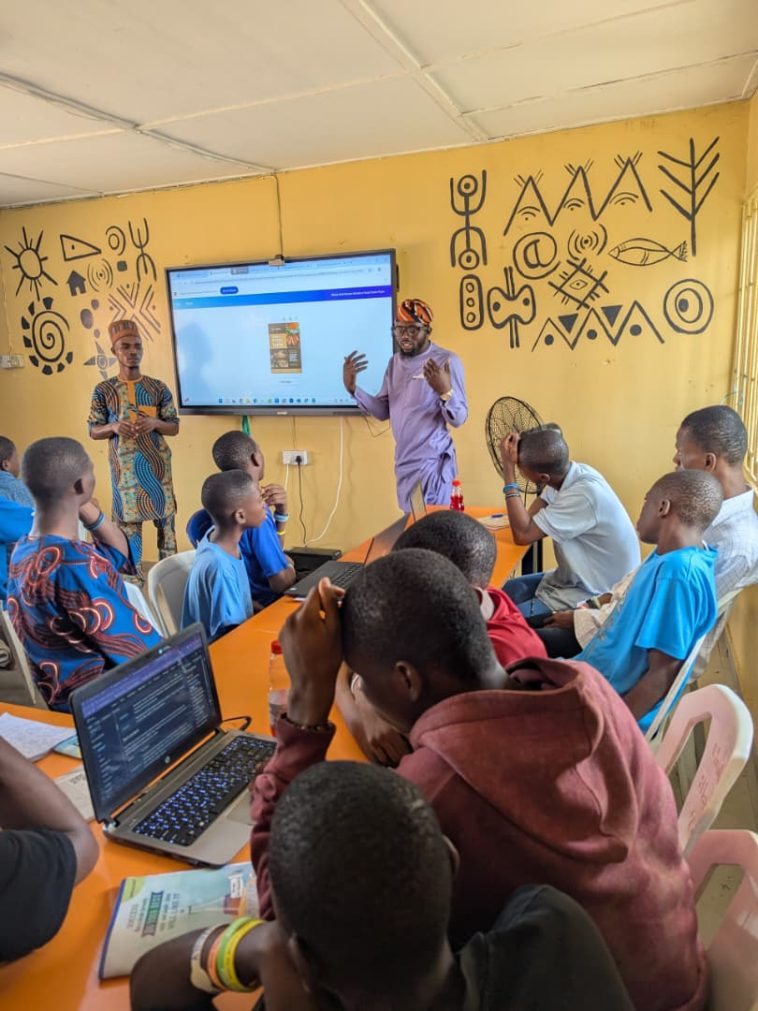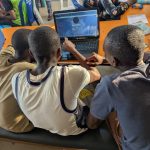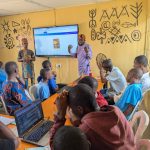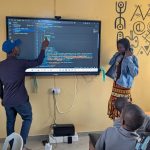By: Inmates Educational Foundation (IEF) in partnership with Creative Digita Technologies (CDT), supported by Nigeria Youth Futures Fund (NYFF) and Lateef Jakande Leadership Academy (LJLA)
On Friday, August 15th, 2025, something remarkable began within the walls of the Correctional Centre for Boys, Oregun, Lagos. What many may see as a place of limitation became a hub of possibility as the third edition of the Digital Skills for Juveniles Project officially kicked off.
Organized by the Inmates Educational Foundation (IEF), led by Mr. Mahfuz Alabidun, in partnership with Creative Digita Technologies (CDT), led by Idris Adegbite, and supported by the Nigeria Youth Futures Fund (NYFF) and the Lateef Jakande Leadership Academy (LJLA), the initiative aimed at equipping 23 boys with future-ready digital skills.
For 4 weeks, these young boys, often excluded from conversations about innovation, were immersed in courses that included Artificial Intelligence, Graphics Design, Robotics, Coding, and Mentorship. The goal was simple yet powerful: to give them a chance at redemption through knowledge.
From Isolation to Innovation
The program began with the setup of an ICT lab, complete with laptops, internet access, alternative power sources, and a Digital Interactive Board donated through Woobii. The students, selected from a pool of over 50, were welcomed with hope and a challenge to see beyond their present circumstances and embrace a future shaped by technology.
The classes were facilitated directly by Idris Adegbite, Founder of CDT, who personally taught the boys in every session, supported by passionate volunteers including Samiat Adesanya (Programs Officer at CDT) and AbdulGaffar Abdullah (Programs Officer at IEF). Their teamwork ensured that each student had guidance, mentorship, and encouragement throughout the program.
The very first week introduced them to Artificial Intelligence. In awe, the students explored tools like ChatGPT, Microsoft Copilot, Grok AI, and Leonardo AI. For the first time, they could write movie scripts with AI, generate images, and even transform them into short video clips.
By the third week, creativity was in full bloom. Using Canva, the boys designed business flyers and created storybooks combining their own AI-generated content with graphic design techniques. One student proudly shared a colorful e-commerce flyer, while another held up a children’s storybook he had written and designed himself.
The program later advanced to Web Design and Coding. Many of these boys wrote their first lines of HTML and CSS code, built layouts, styled pages, and even cloned the landing page of popular tech startup Gokada. Despite slow PCs and limited resources, over 85% of them successfully completed their coding tasks a feat that left facilitators and visitors deeply impressed.
Voices from the Students
Beyond the curriculum, the boys left the program with renewed hope. In their own words:
“Before this training, I never believed I could use a computer beyond just typing. Now, I can design flyers, create storybooks, and even write code to build websites. When I saw my project on the screen, I felt proud for the first time in a long while. Thanks to CDT and IEF for showing me that I can have a future in technology.”
“AI sounded like something far away, something only rich people or people abroad could use. But in this class, I used ChatGPT to write a movie script and even designed my own business flyer on Canva. It made me realize I am not left out of the world. I am thankful to CDT, IEF, and everyone who believed in us.”
“When I wrote my first line of code, I felt like I had just opened a new door in my life. Even though I am here in the correctional centre, this program taught me that my mistakes do not define my future. I want to keep learning and use my skills to help others when I go back home. Thank you CDT and IEF for this chance.”
A Showcase of Hope
The closing ceremony on September 5th, 2025, was more than a graduation; it was a showcase of resilience. Distinguished guests, including Mr. Bashiru Iyapo (Principal of the Correctional Centre), Mrs. Toyin Osoyintola (Permanent Secretary, represented by Mrs. Olaore Agnes Feyisayo), and officials of IEF and CDT, witnessed two students confidently present their projects:
The Founder of IEF, Mr. Mahfuz Alabidun, encouraged the boys to hold on to these skills, reminding them that life after reintegration holds opportunities if they remain disciplined and determined.
Idris Adegbite, Founder of CDT and lead facilitator of the program, charged them to see technology not just as a tool, but as a gateway to global opportunities. “What you have learnt here is marketable and highly sought-after worldwide,” he said. “When you return to society, let this knowledge be your pathway to becoming not just employable, but also role models in your communities.”
Beyond the Boys – A Call for More
The Permanent Secretary’s representative not only commended IEF and CDT for their remarkable efforts but also called for expansion of the program to the Girls Correctional Centre, Idi-Araba, and the Boys Correctional Centre at Isheri.
The principal of the Correctional Centre expressed heartfelt gratitude to the organizers, acknowledging how much brighter and more engaged the boys had become during the program.
Each student proudly received a certificate of participation, a symbol of hope and achievement, while refreshments sealed the celebratory mood.
Why This Matters
For these 23 boys, the Digital Skills for Juveniles Project was not just a class; it was a lifeline. It was proof that rehabilitation is possible when society invests in opportunity rather than exclusion.
With the continued support of NYFF, LJLA, and other future partners, initiatives like this can ensure that correctional centers become centers of transformation where forgotten dreams are rekindled, and new futures are coded line by line, flyer by flyer, and design by design.
Because behind every correctional wall lies untapped potential, waiting only for a chance.
✨ Call to Action for Funders/Supporters
Programs like this thrive on collaboration. To scale and replicate this model across more correctional facilities, partnerships and sponsorships are vital. Together, we can ensure that no child, regardless of their circumstances, is left behind in the digital age.

















